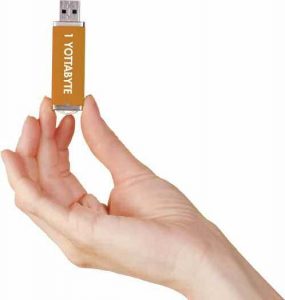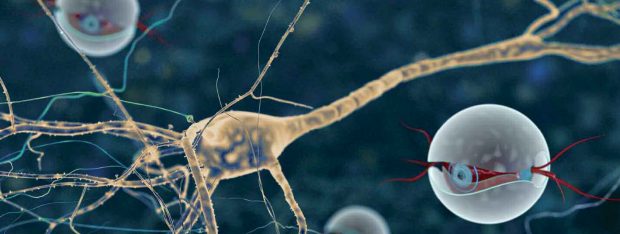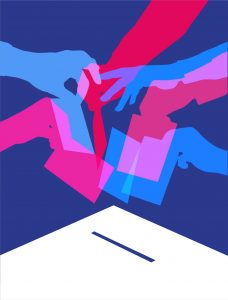 At the dawn of the digital age, storage was measured in kilobytes. Over the years, we’ve gotten used to megabytes, gigabytes and terabytes. But have you heard of petabytes, exabytes, zettabytes and yottabytes?
At the dawn of the digital age, storage was measured in kilobytes. Over the years, we’ve gotten used to megabytes, gigabytes and terabytes. But have you heard of petabytes, exabytes, zettabytes and yottabytes?
What’s Next For:
Revolutions?
Syria?
Mexico?
Japan?
The United States?
Earthquake Safety?
Climate Action?
California Water?
Climate Science?
Solar Energy?
California Fruit Farming?
Technology Investing?
Nanoscience?
Digital Storage?
Artificial Intelligence?
Cyber-Threats?
Social Media?
Space Exploration?
Science Museums?
The Sagehen?
Biodiversity?
The Blind?
Big Data?
Mental Illness?
Health Care Apps?
Maternity Care?
Etiquette?
Ballroom Dance?
Thrill Seekers?
Outdoor Recreation?
Funerals?
Writers?
Movies?
Manga?
Alt Rock?
Women in Mathematics?
You will soon, says Asya Shklyar, Pomona’s first director of high performance computing. Those terms—each indicating a capacity 1,000 times larger than the one before—will become more and more common in the years ahead. And here at Pomona, that future may be nearer than we think, she says, as the College is already gearing up to provide the kind of computing speed and memory needed to support faculty research using such state-of-the-art and memory-hungry processes as machine learning and artificial intelligence (AI).
Pomona faculty are already doing research that can benefit from that kind of memory and speed, Shklyar says. “Like climate modeling—that’s one subject we’re pursuing. And the volcano in Hawaii—we have a model in geology, with the magma and the plates and how the tension works and liquid modeling—a lot of very interesting things.”
So what comes after yottabyte (which is defined as a trillion terabytes)? “That’s the last one that’s officially recognized,” Shklyar said. “There are suggestions, like ‘hellabytes,’ but we don’t know yet.”
 Two words: Killer nanobots.
Two words: Killer nanobots. Artificial Intelligence? Think again.
Artificial Intelligence? Think again. The weathered sign on the old fruit stand at what remains of the last orange grove in Rialto, Calif., reads “Adams Acres” and “Since 1907.” Owner John Adams ’66, a third-generation fruit farmer with a passion for the perfect sweetness of a peach, waves his hand at a plum tree that is in full leaf but bears no fruit.
The weathered sign on the old fruit stand at what remains of the last orange grove in Rialto, Calif., reads “Adams Acres” and “Since 1907.” Owner John Adams ’66, a third-generation fruit farmer with a passion for the perfect sweetness of a peach, waves his hand at a plum tree that is in full leaf but bears no fruit. When we think about the future of solar energy, we usually think about new generations of solar cells that are more efficient or more affordable or longer-lasting—or some happy combination of the three. Lots of scientists and engineers are at work on that side of the equation, including Professor of Physics David Tanenbaum, whose current research involves the development of perovskite and organic polymer-based solar cells that should be cheaper to produce than the silicon variety.
When we think about the future of solar energy, we usually think about new generations of solar cells that are more efficient or more affordable or longer-lasting—or some happy combination of the three. Lots of scientists and engineers are at work on that side of the equation, including Professor of Physics David Tanenbaum, whose current research involves the development of perovskite and organic polymer-based solar cells that should be cheaper to produce than the silicon variety. The study of our changing climate has a newcomer: the social psychology of climate change. Professor of Psychology Adam Pearson is helping lead the way with the growth of a new branch he and his collaborators have coined “social climate science.”
The study of our changing climate has a newcomer: the social psychology of climate change. Professor of Psychology Adam Pearson is helping lead the way with the growth of a new branch he and his collaborators have coined “social climate science.” What’s a California winter with no snow-covered peaks? How will we even know it’s December?
What’s a California winter with no snow-covered peaks? How will we even know it’s December? Will the United States meet its emissions reduction goals as outlined in the Paris Agreement? Unlikely, says recent grad Tom Erb ’18. Without a strong, federal price on carbon—a long shot under the current administration—the U.S. will surely fail.
Will the United States meet its emissions reduction goals as outlined in the Paris Agreement? Unlikely, says recent grad Tom Erb ’18. Without a strong, federal price on carbon—a long shot under the current administration—the U.S. will surely fail. Someday—probably in some crowded city in a developing country—an earthquake will come along that causes a million casualties, warns seismologist and President of GeoHazards International Brian Tucker ’67.
Someday—probably in some crowded city in a developing country—an earthquake will come along that causes a million casualties, warns seismologist and President of GeoHazards International Brian Tucker ’67. Susan McWilliams doesn’t mince words when it comes to predicting the future of the American Experiment.
Susan McWilliams doesn’t mince words when it comes to predicting the future of the American Experiment.